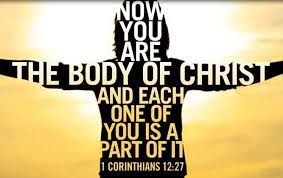 | St Alban’s Episcopal Church Bolivar, Missouri January 22, 2022 The text for Sunday’s sermon:1 Corinthians 12:12-31 |
 1 Cor 12:12-31 Just as the body is one and has many members, and all the members of the body, though many, are one body, so it is with Christ. For in the one Spirit we were all baptized into one body – Jews or Greeks, slaves or free – and we are all made to drink of one Spirit. Indeed the body does not consist of one member but of many. If the foot would say, “Because I am not a hand, I do not belong to the body,” that would not make it any less a part of the body. And if the ear would say, “Because I am not an eye, I do not belong to the body” that would not make it less part of the body. If the whole body were a eye, where would the hearing be? If the whole body were hearing, where would the sense of smell be? But as it is, God has arranged the members in the body, each one of them as he chose. If all were a single member, where would the body be? As it is there are many members, yet one body. The eye cannot say to the hand, “I have no need of you. “On the contrary, the members of the body that seem to be weaker are indispensable, and those members of the body that we think less honorable we clothe with greater honor, and our less respectable members are treated with greater respect; whereas our more respectable members do not need this. But God has so arranged the body, giving the greater honor to the inferior member, that there may be no dissention within the body but the members may have the same care for one another. If one member suffers, all suffer with it; if one member is honored, all rejoice together with it. Now you are the body of Christ and individually members of it. And God has appointed in the church first apostles, second prophets, third teachers; then deeds of power, then gifts of healing, forms of assistance, forms of leadership, various kinds of tongues. Are all apostles? Are all prophets? Are all teachers? Do all work miracles? Do all possess the gifts of healing? Do all speak in tongues? Do all interpret? But, strive for the greater gift.  Notice how this passage begins – and see if you can guess what the conflicts and dissentions were really about. Paul isn’t actually arguing about whether one “job” is more important than another. And paying most attention to the final paragraph distracts us a bit from the first. The Corinthians are agitated over some very real differences between members of the Church. Corinth, remember, was a busy city – and attracted a whole lot of people. So did the church. Some of the members preferred Paul’s preaching to Peter’s – Some opted to deny authority to anyone but Jesus – even though he was no longer visibly present to anyone. You can imagine what that looked like as the Jesus-only people also argued among themselves about what Jesus really said or did or meant. Some of the believers came from a Jewish background, in which context Jesus’ life, death and ministry would have been heard very differently from the way Gentile Christians heard it. You can be sure they weren’t completely at ease with each other. And some were free men, some were slave owners, some were slaves – *The context here matters as well. Slaves in the Roman empire often held important positions and responsibility, and were not generally what we think of when we imagine southern slavery in our own country. Nevertheless, the point of view of a slave, however honored could not be the same as the perspective of one who purchased slaves. Or one who never was enslaved. None of them would have supported evil-doing. None of them were “bad” guys. But you can well imagine that there were plenty of opportunities for interpersonal conflict and misunderstanding. So what was Paul’s point? What did he insist was their common experience, that should lead to a real common life together?”…we were all baptized into one body – made to drink of one Spirit.” |

No responses yet